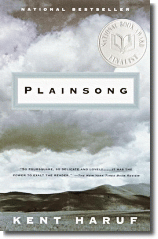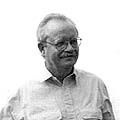|
_________________________________________________________
 PLAINSONG PLAINSONG
by Kent Haruf
(fiction)
Published by Vintage Books, a division of
Random House, Inc.
Copyright © 1999 by Kent Haruf
(Chapters used with permission of publishers and authors.)
If you enjoy reading this book and you’d like to read other books delivered each day in your email, sign up at these participating libraries:
_________________________________________________________
 Dear Reader, Dear Reader,
You can start reading PLAINSONG, right now. If you enjoy reading, and would like to have a 5-minute read, from a book, delivered to you every day in your email,
be sure to join one of these book clubs. Every day you'll receive a portion of a chapter from a book. After you've had a chance to read two or three chapters, we'll start a new book. Before long, you'll be hooked
on reading again. Even if you think you don't have time to read, sign up and let our email book clubs work their magic.
Thanks for reading with me today. It's so good to read with friends
Suzanne Beecher
Suzanne@emailbookclub.com
__________________________________________________________
CHAPTER ONE Guthrie.
Here was this man Tom Guthrie in Holt standing at the back window in the kitchen of his house smoking cigarettes and looking out over the back lot where
the sun was just coming up. When the sun reached the top of the windmill, for a while he watched what it was doing, that increased reddening of sunrise along the
steel blades and the tail vane above the wooden platform. After a time he put out the cigarette and went upstairs and walked past the closed door behind which
she lay in bed in the darkened guest room sleeping or not and went down the hall to the glassy room over the kitchen where the two boys were.
The room was an old sleeping porch with uncurtained windows on three sides, airy-looking and open, with a pinewood floor. Across the way they were still
asleep, together in the same bed under the north windows, cuddled up, although it was still early fall and not yet cold. They had been sleeping in the same bed for
the past month and now the older boy had one hand stretched above his brother's head as if he hoped to shove something away and thereby save them
both. They were nine and ten, with dark brown hair and unmarked faces, and cheeks that were still as pure and dear as a girl's.
Outside the house the wind came up suddenly out of the west and the tail vane
turned with it and the blades of the windmill spun in a red whir, then the wind died down and the blades slowed and stopped.
You boys better come on, Guthrie said.
He watched their faces, standing at the foot of the bed in his bathrobe. A tall man with thinning black hair, wearing glasses. The older boy drew back his hand and
they settled deeper under the cover. One of them sighed comfortably.
Ike.
What?
Come on now.
We are.
You too, Bobby.
He looked out the window. The sun was higher, the light beginning to slide down the ladder of the windmill, brightening it, making rungs of rose-gold.
When he turned again to the bed he saw by the change in their faces that they were awake now. He went out into the hall again past the closed door and on
into the bathroom and shaved and rinsed his face and went back to the bedroom at the front of the house whose high windows overlooked Railroad Street and
brought out shirt and pants from the closet and laid them out on the bed and took off his robe and got dressed. When he returned to the hallway he could hear
them talking in their room, their voices thin and clear, already discussing something, first one then the other, intermittent, the early morning matter-of-fact
voices of little boys out of the presence of adults. He went downstairs.
Ten minutes later when they entered the kitchen he was standing at the gas stove
stirring eggs in a black cast-iron skillet. He turned to look at them. They sat down at the wood table by the window.
Didn't you boys hear the train this morning?
Yes, Ike said.
You should have gotten up then.
Well, Bobby said. We were tired.
That's because you don't go to bed at night.
We go to bed.
But you don't go to sleep. I can hear you back there talking and fooling around.
They watched their father out of identical blue eyes. Though there was a year
between them they might have been twins. They'd put on blue jeans and flannel shirts and their dark hair was uncombed and fallen identically over their
unmarked foreheads. They sat waiting for breakfast and appeared to be only half awake.
Guthrie brought two thick crockery plates of steaming eggs and buttered toast to
the table and set them down and the boys spread jelly on the toast and began to eat at once, automatically, chewing, leaning forward over their plates. He carried two glasses of milk to the table.
He stood over the table watching them eat. I have to go to school early this morning, he said. I'll be leaving in a minute.
Aren't you going to eat breakfast with us? Ike said. He stopped chewing
momentarily and looked up.
I can't this morning. He recrossed the room and set the skillet in the sink and ran water, into it.
Why do you have to go to school so early?
I have to see Lloyd Crowder about somebody.
Who is it?
A boy in American history.
What'd he do? Bobby said. Look off somebody's paper?
Not yet. I don't doubt that'll be next, the way he's going.
Ike picked at something in his eggs and put it at the rim of his plate. He looked up again. But Dad, he said.
What.
Isn't Mother coming down today either?
I don't know, Guthrie said. I can't say what she'll do. But you shouldn't worry. Try not to. It'll be all right. It doesn't have anything to do with you.
He looked at them closely. They had stopped eating altogether and were staring out the window toward the barn and corral where the two horses were.
You better go on, he said. By the time you get done with your papers you'll be late for school.
He went upstairs once more. In the bedroom he removed a sweater from the
chest of drawers and put it on and went down the hall and stopped in front of the closed door. He stood listening but there was no sound from inside. When he
stepped into the room it was almost dark, with a feeling of being hushed and forbidding as in the sanctuary of an empty church after the funeral of a woman
who had died too soon, a sudden impression of static air and unnatural quiet. The shades on the two windows were drawn down completely to the sill. He
stood looking at her. Ella. Who lay in the bed with her eyes closed. He could just make out her face in the halflight, her face as pale as schoolhouse chalk and her
fair hair massed and untended, fallen over her cheeks and thin neck, hiding that much of her. Looking at her, he couldn't say if she was asleep or not but he
believed she was not. He believed she was only waiting to hear what he had come in for, and then for him to leave.
Do you want anything? he said.
She didn't bother to open her eyes. He waited. He looked around the room. She had not yet changed the chrysanthemums in the vase on the chest of drawers and
there was an odor rising from the stale water in the vase. He wondered that she didn't smell it. What was she thinking about.
Then I'll see you tonight, he said.
He waited. There was still no movement.
All right, he said. He stepped back into the hall and pulled the door shut and went on down the stairs.
As soon as he was gone she turned in the bed and looked toward the door. Her
eyes were intense, wide-awake, outsized. After a moment she turned again in the bed and studied the two thin pencils of light shining in at the edge of the window
shade. There were fine dust motes swimming in the dimly lighted air like tiny creatures underwater, but in a moment she closed her eyes again. She folded her arm across her face and lay unmoving as though asleep.
CLICK HERE TO CONTINUE READING
__________________________________________________________
 BUY THE BOOK BUY THE BOOK
PLAINSONG
By Kent Haruf
(Paperback)
Retail $13.00
Book Club Price: $9.89
Click Here to purchase book.
Click here for the best price on OTHER BOOKS
________________________________________________________
 Kent Haruf is the author of two previous novels, Where
You Once Belonged, winner of a Whiting Foundation Award and a citation from the Pen/Hemingway Foundation, and The Tie That Binds. In Plainsong, Mr. Haruf writes of a town and a few people that are integral
to that town's character. His chapters alternate between the experiences of Tom Guthrie, a high school history teacher who is father to two boys, Ike and Bobby, and husband to a wife who is
slipping away from them into a deep depression. There is also a seventeen-year-old high school girl named Victoria Robideaux who, on the first
day we meet her, is living with her mother but will soon find herself on a journey towards a home and all that is implicit in that word. We also meet the brothers
McPheron, two elderly cattle ranchers who live a simple, hardscrabble life where they know no one so well as each other and their livestock and oh, the skies of the Eastern Plains of Holt, Colorado. Kent Haruf is the author of two previous novels, Where
You Once Belonged, winner of a Whiting Foundation Award and a citation from the Pen/Hemingway Foundation, and The Tie That Binds. In Plainsong, Mr. Haruf writes of a town and a few people that are integral
to that town's character. His chapters alternate between the experiences of Tom Guthrie, a high school history teacher who is father to two boys, Ike and Bobby, and husband to a wife who is
slipping away from them into a deep depression. There is also a seventeen-year-old high school girl named Victoria Robideaux who, on the first
day we meet her, is living with her mother but will soon find herself on a journey towards a home and all that is implicit in that word. We also meet the brothers
McPheron, two elderly cattle ranchers who live a simple, hardscrabble life where they know no one so well as each other and their livestock and oh, the skies of the Eastern Plains of Holt, Colorado.
Interview with Kent Haruf
________________________________________________________
READ BOOKS IN YOUR EMAIL
If you like reading this book and you’d like to read more books in your email, join an OnLine Book Club. Each day you’ll receive a portion of book that takes
about five minutes to read. You can read fiction, nonfiction, business, inspirational, teen, romance or you can listen to audio books. To join an OnLine Book Club visit these participating libraries:
SHARE THE READ WITH YOUR FRIENDS
Be sure to share this book with your friends and relatives. You can copy the link below and send it in an email or click on the FILE menu in your browser, select SEND LINK option.
READER COMMENTS:
If you have any questions, comments or book suggestions, please let me know. You can contact me, Suzanne Beecher, at:
Suzanne@emailbookclub.com
CLICK HERE TO CONTINUE READING
|